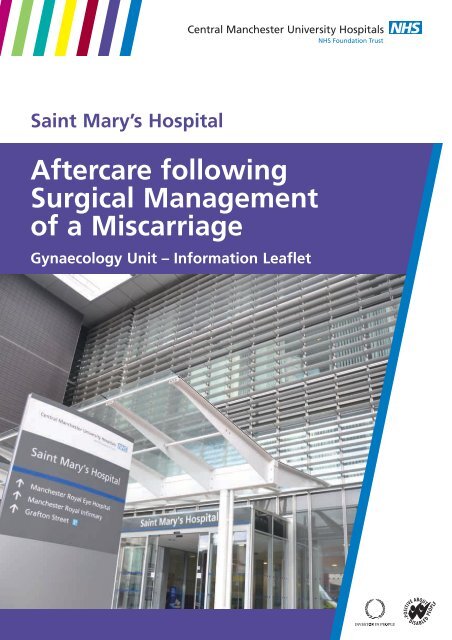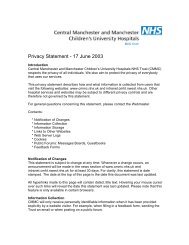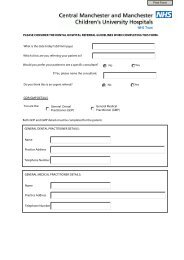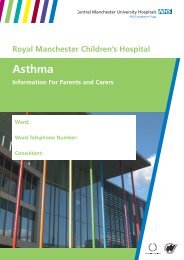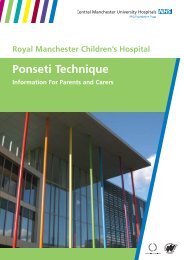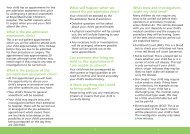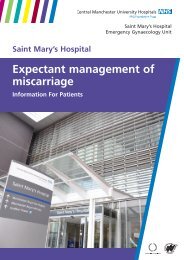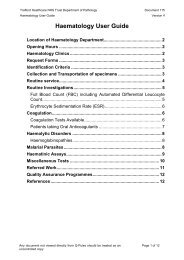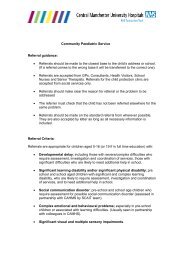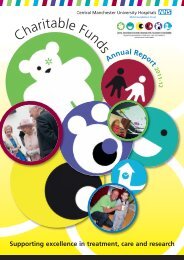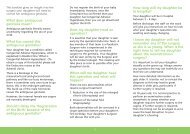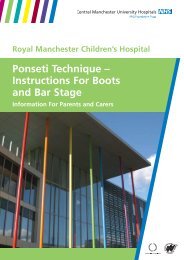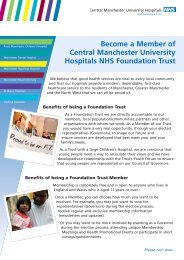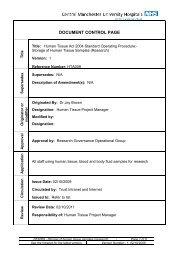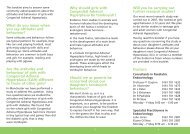Aftercare following surgical management of miscarriage - Central ...
Aftercare following surgical management of miscarriage - Central ...
Aftercare following surgical management of miscarriage - Central ...
Create successful ePaper yourself
Turn your PDF publications into a flip-book with our unique Google optimized e-Paper software.
Saint Mary’s Hospital<br />
<strong>Aftercare</strong> <strong>following</strong><br />
Surgical Management<br />
<strong>of</strong> a Miscarriage<br />
Gynaecology Unit – Information Leaflet
We are sorry that you have received bad news about your<br />
pregnancy. We realise that this is a very distressing time for you.<br />
The staff are here to support and help you throughout this<br />
difficult time. If, after reading this leaflet, there is anything that<br />
you are worried about or unsure <strong>of</strong>, please do not hesitate to<br />
ask or let us know.<br />
What can I expect after the procedure?<br />
The anaesthetic which was used to put you to sleep will<br />
continue to act on your body for the next 48 hours, so you are<br />
likely to feel sleepy. This will wear <strong>of</strong>f, but until it does, be kind<br />
to yourself and rest as much as possible.<br />
For 24 hours after the anaesthetic YOU MUST NOT:<br />
• Drive a vehicle<br />
• Drink alcohol<br />
• Make important decisions (such as signing any legal<br />
documents)<br />
• Use hazardous machinery<br />
• Engage in sport, strenuous exercise, heavy work or lifting<br />
◆<br />
Pain<br />
For the next week or two you may experience period-like<br />
cramps. We advise you to get plenty <strong>of</strong> rest. You can take<br />
any painkillers which suit you to ease any discomfort, but<br />
please ensure that you follow the instructions on the packet<br />
and do not exceed the stated dosage. Some women find<br />
that a hot water bottle also provides some pain relief and<br />
comfort.<br />
3
◆<br />
◆<br />
Sickness<br />
Sometimes you can feel sick <strong>following</strong> the procedure. This<br />
will usually settle within a few hours, however, if it persists,<br />
drink water and contact your General Practitioner (GP).<br />
Bleeding<br />
This may vary. You may bleed for one to two weeks or have<br />
little or no bleeding at all. Your bleeding may be bright red<br />
or dark brown and you may lose some small clots: do not be<br />
concerned about this. Your next period may be heavier than<br />
usual, and will usually happen 3-6 weeks after this<br />
treatment.<br />
◆ Infection<br />
Whilst you are bleeding, the cervix (neck <strong>of</strong> the womb) may<br />
be open, and there is a risk <strong>of</strong> infection. To reduce this risk,<br />
we advise that for the first 2 weeks you:<br />
• Avoid having sexual intercourse. If you do, please use a<br />
condom<br />
• Do not use tampons<br />
• Do not swim or undertake water sports (baths and showers<br />
are allowed)<br />
◆<br />
Feelings<br />
As an individual your feelings are unique. Over the next few<br />
weeks, you may experience days when you feel completely<br />
‘back to normal’ and days when you may feel sadness or a<br />
sense <strong>of</strong> loss. These feelings are all normal, but you may find<br />
it helpful to talk to someone you know and whom you feel<br />
close to.<br />
If you do wish to talk to someone about your feelings and<br />
are unable to do so with a partner, close friend or family<br />
member, you might like to consider contacting our<br />
Counsellor on the number given overleaf.<br />
4
When should I be concerned?<br />
If you experience any <strong>of</strong> the <strong>following</strong>, please either contact us<br />
on the numbers detailed below or contact your GP.<br />
• Severe pain or the pain becomes worse rather than better<br />
• Your blood loss becomes very heavy or prolonged (longer<br />
than 2 weeks)<br />
• You lose a lot <strong>of</strong> large clots<br />
• Your discharge becomes <strong>of</strong>fensive smelling<br />
• You experience chills or a temperature<br />
Will I need a follow-up appointment?<br />
You may wish to see your GP in 4-6 weeks to check that your<br />
body is getting back to normal.<br />
When can I start trying for another baby?<br />
It is perfectly safe to start trying for another pregnancy once<br />
you and your partner feel ready to do so (providing you feel<br />
well and you have stopped bleeding). For dating purposes,<br />
there is some advantage in waiting until your next normal<br />
period, however if you conceive before your period there is no<br />
increased risk <strong>of</strong> <strong>miscarriage</strong>.<br />
If you are planning to get pregnant again, we recommend that<br />
you take folic acid tablets (400 micrograms per day) whilst you<br />
are trying to conceive and until the 12th week <strong>of</strong> the<br />
pregnancy. This helps to reduce the risk <strong>of</strong> Spina-bifida, an<br />
abnormality <strong>of</strong> the baby’s spine. You can buy tablets at your<br />
local chemist or supermarket or, alternatively, you can obtain<br />
them from your GP.<br />
5
Contact Numbers:<br />
Emergency Gynaecology Unit 0161 276 6204<br />
Between 9.00am-4.30pm)<br />
Ward 63<br />
0161 276 6517 or<br />
(24 hours) 0161 701 0048<br />
Counsellors (confidential service) 0161 276 6283<br />
Useful Addresses:<br />
The Miscarriage Association<br />
C/o Clayton Hospital<br />
Northgate<br />
Wakefield<br />
West Yorkshire WF1 3JS<br />
6
No Smoking Policy<br />
The NHS has a responsibility for the nation’s health.<br />
Protect yourself, patients, visitors and staff by adhering to our<br />
no smoking policy. Smoking is not permitted within any <strong>of</strong> our<br />
hospital buildings or grounds.<br />
The Manchester Stop Smoking Service can be contacted on<br />
Tel: (0161) 205 5998 (www.stopsmokingmanchester.co.uk).<br />
Translation and Interpretation Service<br />
Do you have difficulty speaking or understanding English?<br />
☎ 0161 276 6202/6342<br />
© Copyright to <strong>Central</strong> Manchester University Hospitals NHS Foundation Trust<br />
TIG 86/02 Produced October 2009 Review Date October 2010 (SF Taylor CM3095)


